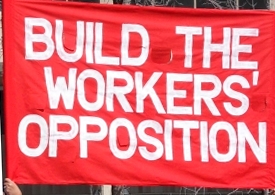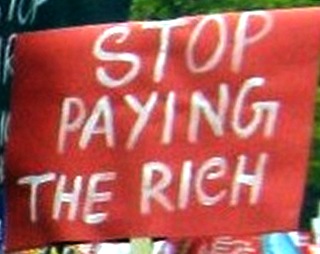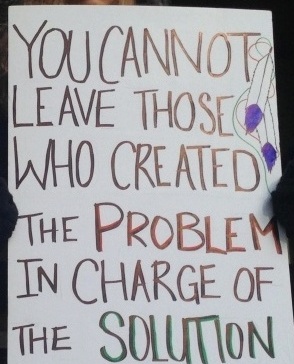|
June 21, 2021 - No. 59
Further Evidence of the Rich Becoming
Richer and Workers Poorer
Plundering of the U.S. Economy
During the Pandemic
 
• How Corporations Pumped Up CEO Pay While Their Low-Wage Workers Suffered in the Pandemic
Further Evidence of the Rich Becoming Richer and Workers Poorer
A recent report by Sarah Anderson of the U.S.-based Institute for
Policy Studies (IPS) entitled "Pandemic Pay Plunder" provides
details of the extent of CEO corruption and plunder of social wealth
during the pandemic. Average CEO expropriation of value from the
socialized economy rose 15.9 per cent in 2020.
Under the cover of declaring they would forgo salary increases
during the pandemic, CEOs cashed in company stock options and vested
stock, greatly increasing their personal wealth. Stock-related
components make up roughly three-fourths of total CEO expropriation of
value according to the IPS.
In contrast to the 15.9 per cent increase of CEO expropriated value,
the U.S. Labor Department (USLD) reports working class individual
reproduced-value representing workers' wages and benefits from the sale
of their capacity to work increased just 1.8 per cent in 2020.
The sharp difference in workers' reproduced-value and CEO
expropriation of realized added-value during 2020 meant the
CEO-to-worker difference in claims on new value jumped from 276.2 times
in 2019 to 307.3 times in 2020. This figure represents the average
multiple of CEO expropriated value to workers' wages and benefits.
U.S. Annual Price Inflation Now at 4.2 Per Cent
Workers' average claim on the new value they produce for the sale
of their capacity to work increased 1.8 per cent during 2020. This was
just 0.2 per cent above what the USLD analyzed as the 1.6 per cent
increase in the cost of living for the year generally called price
inflation.
The USLD notes that price inflation dropped for several months
during the early months of the pandemic but has since risen
significantly, especially in 2021. For the previous 12 months to the
end of March 2021, the annual price inflation rate jumped to 2.6 per
cent and in just one more month to the end of April, the annual rate
has soared to 4.2 per cent. U.S. workers are confronted with the task
of fighting for large wage increases just to keep pace with the rapidly
rising cost of living. Price inflation also bodes ill for interest
rates on borrowed money including mortgages as lenders will want to
push rates higher.
Carnival Cruise Lines
Regarding CEO expropriation of social wealth, Sarah Anderson gives
the example of Arnold Donald, CEO of Carnival Cruise Lines. She writes,
"After the pandemic shut down their industry last March, Carnival and
other cruise lines scrambled to get paying customers home -- often
while stranding employees at sea. As late as August, the
company still had employees stuck on ships. That same month, the
company's board awarded CEO Arnold Donald a special 'retention
and incentive' stock grant that inflated his 2020 compensation to $13.3
million -- 490 times more than the company's median worker pay of
just $27,151."
 Anderson
says that to survive Carnival and other cruise lines relied on a March
23 announcement that the U.S. Federal Reserve (the Fed) would engage in
"unprecedented lending" at cheap rates and "backstop loans" from the
global private investment cartels. The Fed's announcement to buy
"unlimited" bonds to free up capital for lenders to invest in
companies allowed Carnival and other cruise ship companies to raise
money at low rates. The companies issued billions of dollars in bonds
and equity that previously lacked buyers who were now willing because
of the Fed's "unprecedented lending" at cheap rates. Anderson
says that to survive Carnival and other cruise lines relied on a March
23 announcement that the U.S. Federal Reserve (the Fed) would engage in
"unprecedented lending" at cheap rates and "backstop loans" from the
global private investment cartels. The Fed's announcement to buy
"unlimited" bonds to free up capital for lenders to invest in
companies allowed Carnival and other cruise ship companies to raise
money at low rates. The companies issued billions of dollars in bonds
and equity that previously lacked buyers who were now willing because
of the Fed's "unprecedented lending" at cheap rates.
The cruise lines including the Disney cartel are global monopolies.
They are not registered in the U.S. and do not pay U.S. corporate
taxes. Regardless of this fact, the Fed intervention allowed the global
companies to borrow heavily at preferred rates during the pandemic and
rescue their investments from bankruptcy.
Anderson writes, "Within days [of the Fed announcement], Carnival's
investment bankers at JPMorgan Chase & Co. were talking to
conventional investors such as AllianceBernstein Holding and Vanguard
Group about a deal. By April 1, the company had raised almost $6
billion in bond markets, paying rates far below those executives had
discussed just days earlier [before the Fed announcement]."
Anderson writes, "Carnival had to rely on a Federal Reserve lifeline
to stay afloat, but board members still went out of their way to pad
the CEO's paycheque while their workers struggled. This behaviour, I
learned, was common among America's top tier corporations. In a new
report for the Institute for Policy Studies, I found that 51 of the 100
largest low-wage U.S. employers pulled similar manoeuvres to pump up
CEO pay during the pandemic. Average CEO compensation at these
companies rose 29 per cent to $15.3 million in 2020, while typical
worker pay dropped by two per cent to $28,187."
Tyson Foods
Anderson gives the example of meatpacker Tyson Foods whose employees
suffered at least 12,000 COVID-19 infections and 38 deaths. She writes,
"When executives [in Tyson] didn't meet their cash bonus targets, Tyson
directors gave them stock awards to make up the difference. Company
chair John Tyson, the heir and grandson of the
company founder, hardly needed that extra boost. His personal wealth
has increased 72 per cent during the pandemic -- to $2.6 billion.
"Fifteen of the 51 low-wage employers that bent rules to inflate
executive pay had CEO-worker pay ratios higher than 1,000 to one. At
Chipotle, the board modified performance metrics to boost the CEO's pay
by $23 million to a total of $38 million, 2,898 times median worker
pay."
 Anderson
charges that following the 2008 economic crisis CEOs of the largest
companies, "to hit their bonus targets," have made U.S. workers "more
vulnerable by outsourcing jobs and turning remaining jobs into poverty
jobs with no benefits." She declares the U.S. economy "needs to change
course" and "steer corporations toward pay
fairness." She does not say how "pay fairness" can be achieved, what
she would consider "fair" or what social force is capable of
accomplishing this goal of "steering corporations" towards what goes
against their aim of maximum profit. Those who own and control the
basic sectors of the socialized economy also exercise overbearing
influence over
official politics with their money and social connections, and
vehemently oppose any new pro-social direction for the economy. Anderson
charges that following the 2008 economic crisis CEOs of the largest
companies, "to hit their bonus targets," have made U.S. workers "more
vulnerable by outsourcing jobs and turning remaining jobs into poverty
jobs with no benefits." She declares the U.S. economy "needs to change
course" and "steer corporations toward pay
fairness." She does not say how "pay fairness" can be achieved, what
she would consider "fair" or what social force is capable of
accomplishing this goal of "steering corporations" towards what goes
against their aim of maximum profit. Those who own and control the
basic sectors of the socialized economy also exercise overbearing
influence over
official politics with their money and social connections, and
vehemently oppose any new pro-social direction for the economy.
A change in the direction of the economy has to come from the
working class who receive reproduced-value in exchange for their
capacity to work. The reproduced-value is in direct contradiction with
the added-value the imperialists expropriate from the new value workers
produce. This clash over the new value arises from the basic
contradiction in the economy between its socialized nature but private
ownership and control. This means in essence that change can only come
from the working class itself organizing and waging class struggle in
its own interests and that of the society with the aim of giving the
economy a new pro-social direction, and bringing ownership and
control of the basic sectors into conformity with the already
socialized productive forces.

Below is information from "Pandemic Pay
Plunder," the study of the U.S. economy during the pandemic by the
Institute for Policy Studies.
More than half of the country's 100 largest low-wage employers
rigged pay rules in 2020 to give CEOs 29 per cent average raises while
their frontline employees made two per cent less.
In 2008, executives chasing after huge paydays crashed the U.S.
economy. That crisis left millions of Americans homeless and jobless.
... Today, we're living through a period of even greater national suffering.
Over the course of the pandemic, our frontline workers have repeatedly proven how absolutely essential their work remains.
[The pandemic economic crisis left working families much more
vulnerable with] nearly 40 per cent of Americans unable to afford a $400
emergency.
Meanwhile, corporate chief executives in the United States have
continued to score the sorts of windfalls that have ballooned
billionaire wealth by over $1 trillion since the pandemic began. Our
corporate compensation practices have, in effect, delivered prosperity
for the few and precarity for the many.
Key Findings of the Report
- Of the 100 S&P 500 firms with the lowest median worker wages,
51 bent their own rules in 2020 to pump up executive paycheques.
- Common manipulations included lowering performance bars to help
executives meet bonus targets, awarding special "retention" bonuses,
excluding poor second-quarter results from evaluations, and replacing
performance-based pay with time-based awards.
- Among those 51 companies:
CEO compensation [for 2020] averaged $15.3 million, up 29 per cent from 2019.
CEO-worker pay ratios averaged 830 to 1 in 2020.
Median worker pay ran $28,187 on average in 2020, two per cent lower than in 2019.
The pandemic has brutalized low-wage workers, particularly workers
of colour. These employees suffered 2020's highest job loss rates. They
also suffered the highest COVID-19 infection rates.
While these workers suffered, a majority of large low-wage employers
responded by boosting their executive pay. Despite the pandemic
economic crisis, the Wall Street Journal projects that CEO pay at major
U.S. corporations will likely end up hitting record highs.
Of the 100 Standard and Poor's 500 (S&P 500) corporations with the lowest median worker
pay, 51 bent their own rules to pump up executive paycheques. These 51
firms awarded CEOs bigger paycheques and typical workers smaller ones
than their counterparts at other low-wage S&P 500 firms.
Company Examples
Hilton Worldwide
Hilton CEO Christopher J. Nassetta saw his 2020 compensation package
come to $55.9 million -- the highest among the 100 S&P 500 firms
with the lowest median wages. After Nassetta failed to meet his
performance goals, the Hilton board inflated his paycheque by
"modifying" restricted stock awards. Meanwhile, Hilton slashed their
global
workforce from 173,000 to 141,000. The CEO's paycheque came to 1,953
times as much as the company's median worker pay of $28,608.
Chipotle Mexican Grill
Chipotle CEO Brian R. Niccol made $38 million in 2020 -- a 136 per
cent raise over his 2019 compensation. The board inflated his bonus
by tossing out its poor financial results from the shutdown and
excluding some COVID-19-related costs from his performance evaluation.
Niccol made 2,898 times as much as the company's median worker
pay of $13,127.
Aptiv
Aptiv PLC -- formerly Delphi Automotive -- had the widest pay gap in
the S&P 500 in 2020. Chief executive Kevin Clark's compensation is
valued at $31.3 million -- 5,294 times as much as the company's median
worker pay of $5,906. The Aptiv board inflated Clark's paycheque through
an "update" of annual bonus metrics and by shortening
the performance period for long-term executive incentive awards to
exclude 2020.
YUM Brands
In March 2020, the owner of KFC, Pizza Hut, and Taco Bell announced
that CEO David Gibbs would donate $900,000 of his salary to pay for
$1,000 bonuses for restaurant general managers. But the board changed
its bonus metrics to give Gibbs a $1.4 million cash bonus and a stock
grant valued at $882,127. His special COVID-19 bonuses
totaled more than 2.5 times his voluntary salary cut. This largesse
boosted Gibbs's total compensation to $14.6 million -- 1,286 times
as much as median worker pay of $11,377. The fast food giant did not
offer hazard pay to these frontline employees, whose average wages are
just $9.75 per hour, according to Payscale.
Dollar Tree
After the discount retailer's executives failed to meet their 2020
bonus targets, the Dollar Tree board awarded them restricted stock
grants with approximately the same value. For new CEO Michael Witynski,
who spent less than six months in the top post in 2020, this translated
into a bonus valued at about $1.5 million, boosting his total
compensation to $11.3 million. That's 715 times as much as the pay for
the company' median worker, a part-time U.S. store employee who earned
$15,816.
Coca-Cola
None of the soft drink maker's top executives met their bonus
targets last year, but the Coca-Cola board gave them all bonuses
anyway. For CEO James Quincey, that $960,000 bonus, combined with new
stock-based awards, drove his total compensation package above $18
million, over 1,600 times as much as the company's typical worker
pay. In December 2020, Coca-Cola announced plans to cut about 2,200
jobs, or 17 per cent of its workforce. Coke profits dropped by 13
per cent last year. About 1,200 of the layoffs will hit U.S. workers.
Darden Restaurants
After the pandemic shuttered Olive Garden and Darden's other
full-service restaurant chains, CEO Eugene I. Lee, Jr. gave up most of
his base salary, resulting in a $170,240 reduction for the company's
2020 fiscal year. But even though Lee didn't meet his performance
goals, the board modified its metrics and handed him a $1.9 million
payout anyway. That maneuver inflated his total compensation to $8.7
million -- 538 times as much as median worker pay of $16,137.
Darden is a leading opponent of raising the subminimum tipped wage,
which has remained stuck at $2.13 per hour for more than 20 years. The
advocacy group One Fair Wage has just filed a lawsuit against
Darden, alleging their tipped wage practices increase sexual harassment
and widen racial and gender income gaps.
Johnson Controls
Johnson Controls CEO George R. Oliver agreed to trim his 2020 base
salary by a little over $150,000 in 2020, but his board more than made
up for that gesture by manipulating metrics to increase his cash bonus
to more than $2 million. His total compensation came to $13.7 million --
357 times more than median worker pay of $38,462.
Johnson Controls is in the process of cutting 6,500 jobs.
Carnival
Carnival, the world's largest cruise operator, secured $6 billion in
low-cost financing in April 2020, thanks to a Federal Reserve lifeline.
But as of August, the company still had some employees stuck on ships.
That same month, the company's board awarded CEO Arnold Donald special
pandemic "retention and incentive" stock grants valued at
more than $5 million. Arnold's total 2020 compensation came to $13.3
million -- 490 times more than the company's median worker pay of
just $27,151.
Tyson Foods
When executives didn't meet their cash bonus targets, Tyson Foods
board members gave them stock awards to make up the difference. CEO
Noel White wound up with total compensation of nearly $11 million --
294 times as much as typical worker pay of $37,444. John Tyson,
the heir and grandson of the company founder, watched his
personal wealth increase 72 per cent during the pandemic -- to $2.6
billion. Frontline Tyson employees, meanwhile, suffered more COVID-19
infections and deaths than those at any other meatpacker. More than
12,000 Tyson workers have been infected by the virus and at least 38
have lost their lives to it.
Walmart has a pay gap of 1,078 between the CEO and workers' median pay.
Amazon has a pay ratio of 1,596 between highest-paid executive and
median pay. David H. Clark, CEO of Amazon Worldwide Consumer received
$46.3 million in 2020.
Home Depot has a 551-to-1 CEO to pay gap.
The Empty Gesture of CEO Salary Cuts
More than 500 publicly held U.S. companies announced cuts to their
CEO base salary in 2020. These moves garnered laudatory press coverage,
but had a negligible impact on actual pay levels for the simple reason
that straight salary makes up, on average, only 10 per cent of total
executive compensation. Since the start of the pandemic crisis,
in numerous cases where CEOs accepted salary reductions, their
corporate boards have rigged the rules to hand out unearned bonuses
that dwarfed the value of those reductions.
Corporate boards have also taken pains to base incentive payouts on
full original base executive salaries. This particular maneuver kept
salary reductions in 2020 from impacting bonus levels, since
corporations typically set bonus targets at a certain percentage of
base salary.
The full report "Pandemic Pay Plunder" is available here.

(To access articles individually click on the black headline.)
PDF
PREVIOUS
ISSUES | HOME
Website: www.cpcml.ca
Email: office@cpcml.ca
|

